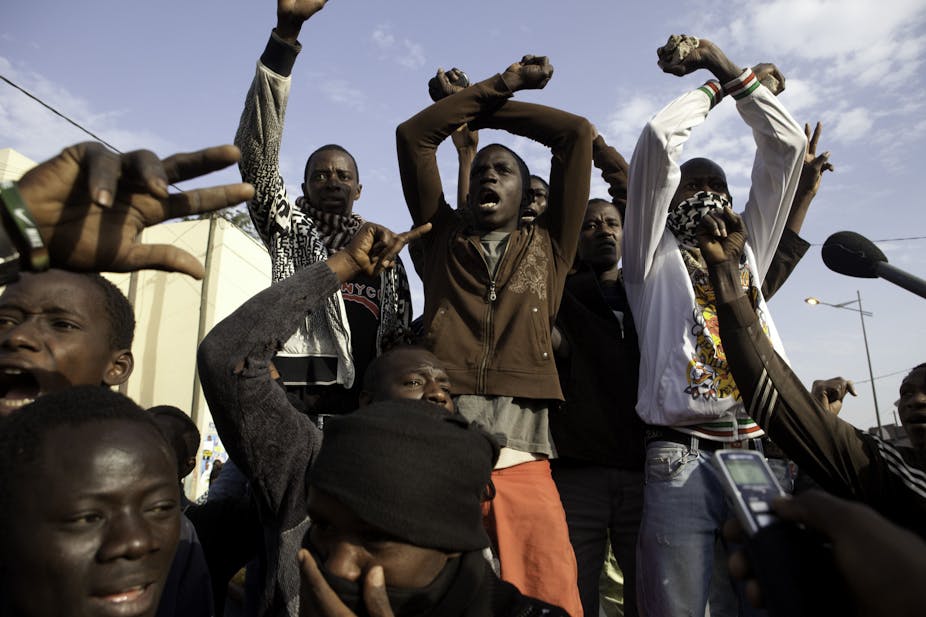The urgency of promoting social justice in Africa as the best firewall against the spread of extremism grows daily, as we witness increasing terrorist attacks on soft targets in African cities – Bamako, Ouagadougou and Grand-Bassam.
US President Barack Obama would do well to refocus America’s conversation on Africa to support this peaceful activism. Niger provides a good case study for this.
The US’s strategy in Africa combines military interventions overseen by the US Africa Command – including drone reconnaissance and small-scale special operations. This is accompanied by USAID’s social development initiatives to improve quality of life and foster civil society. In this policy scheme, Africa is seen as a patchwork of nations in need of humanitarian aid and military assistance.
It would be unreasonable to expect the Obama administration to abandon drone landing strips in Niger immediately. But drawing attention to the cause of grassroots activists who are fighting for social justice and democracy right now would be a powerful addition to his arsenal. It would be vastly more effective than sending Samantha Power, US ambassador to the United Nations, to talk to villagers in Boko Haram territory.
The case for supporting local activists in their fight for social justice and democracy is clear.
In countries where profits from the exploitation of natural resources are taxed equitably and shared with the local population through reinvestment in infrastructure, health care and education, the percentage of people living in poverty declines.
Also, governments that combine improvements in quality of life with transparency and fair elections achieve better economic results and greater political stability.
When leaders do not protect the people’s interests and resources are extracted without taxing and sharing the revenues, a sentiment of dispossession can emerge that can be destabilising. And evidence shows extremist groups are more successful at recruiting new members among disaffected youth, the poor and unemployed.
The case of Niger
In Niger, for instance, the US has spent millions on humanitarian aid. Yet the country has dropped to last place according to the United Nations Human Development Report. The average adult in Niger has 5.4 years of schooling and human development is lagging behind the Democratic Republic of Congo and Somalia with a growth rate of 1.8%.
But the country is hardly poor. In fact, it is rich in uranium, oil and gold. The problem is that the people see less than ten cents on the dollar of profits from these resources.
Yet its people continue to endure extreme poverty because they have not had representative governments that are able to protect their interests.
France, the former colonial power, has dominated Niger’s uranium industry since it was discovered in 1957. New archival evidence shows how the French sought to maintain indirect influence in the country at the time of independence. The French continue to exercise influence to maintain access to uranium as cheaply as possible. Nigerien ministers who are members of a corrupt elite are willing to do business and pad their pockets at the people’s expense.
For many, President Mahamadou Issoufou’s credibility is tainted. Although he has been re-elected to a second term, this happened while the main opposition leader was detained. In 2013 Issoufou renegotiated Niger’s strategic agreement with the French-owned company Areva. He accepted a tax rate on uranium revenues not to exceed 12%. That is by any objective standard unfair to the people of Niger.
In Botswana, the tax rate on revenues from diamond mining is roughly 80%, which has led to shared prosperity from reinvestment in education, health and infrastructure. Botswana left the list of least-developed nations in 1995 and is now an upper-middle-income country.
Activists fight for greater transparency
Grassroots activists have been calling for greater transparency in the management of Niger’s uranium industry because it would provide a basis for informed debate and public scrutiny. But such demands expose them to risk at home and the reach of their message is limited abroad.
One of those activists is Ali Idrissa, the national coordinator of the Organisation for Transparency and Budgetary Analysis. He has been calling on the government to disclose profits from natural resource extraction as required by Niger’s constitution. Idrissa was arrested briefly, along with other activists. Their sin was to characterise the relationship between Areva and Niger as neocolonial at a press conference in advance of François Hollande’s visit in 2014.
Another is Almoustapha Alhacen, the leader of a local NGO Aghirin’man (“human shield” in Tamashek). The civil society activist advocates for environmental protection, human rights and decent working conditions. He exposed deplorable working conditions in French-owned uranium mines – where he has worked for 37 years – as well as radioactive contamination in nearby residential areas.
We ignore naked exploitation at our peril. Leaders of powerful nations who think they can keep pillaging African resources with impunity are sitting on a ticking time-bomb. Sooner or later, people stuck in poverty grow tired of their dispossession and a system that is rigged against them. How long will it take for the growing numbers of terrorists in the Sahel to gain access to the high-grade uranium that helped build France’s nuclear arsenal?
An analogy can be made between activists in Niger and other African countries. Examples of progressive grassroots activism elsewhere are Y’en a Marre (We Are Fed Up) in Senegal, the Balai Citoyen (The Citizen Broom) movement in Burkina Faso and the Cameroonian People’s Party led by Kah Walla in Cameroon.
These groups have employed local strategies and symbols to mobilise popular protest in support of democracy to great effect. In Senegal and Burkina Faso elections have happened, and in Cameroon activists with the Cameroonian People’s Party are now calling for a transition to democracy.
US support would greatly boost the activists’ peaceful efforts. The situation on the ground would improve and terrorists would have a much harder time recruiting volunteers.

